Analysis of International Leadership and Entrepreneurship in SMEs
VerifiedAdded on 2023/06/18
|8
|2259
|218
Report
AI Summary
This report provides an analysis of international leadership and entrepreneurship, focusing on small and medium enterprises (SMEs) and the airline industry. It examines the essential skills of entrepreneurs, such as risk-taking, innovation, and team-building, and their impact on SME development, highlighting how cultural differences can influence the growth of SMEs in international business. The report further explores various leadership styles, including situational, authentic, and transactional leadership, and their application in rebuilding organizational profitability and sustainability within the global airline industry post-pandemic. The importance of experience in the international airline sector for leaders is emphasized, along with the role of culture in shaping leadership approaches. The report concludes that effective leadership and entrepreneurship are critical for achieving business goals, promoting employee motivation, and fostering sustainable growth in both SMEs and the airline industry.
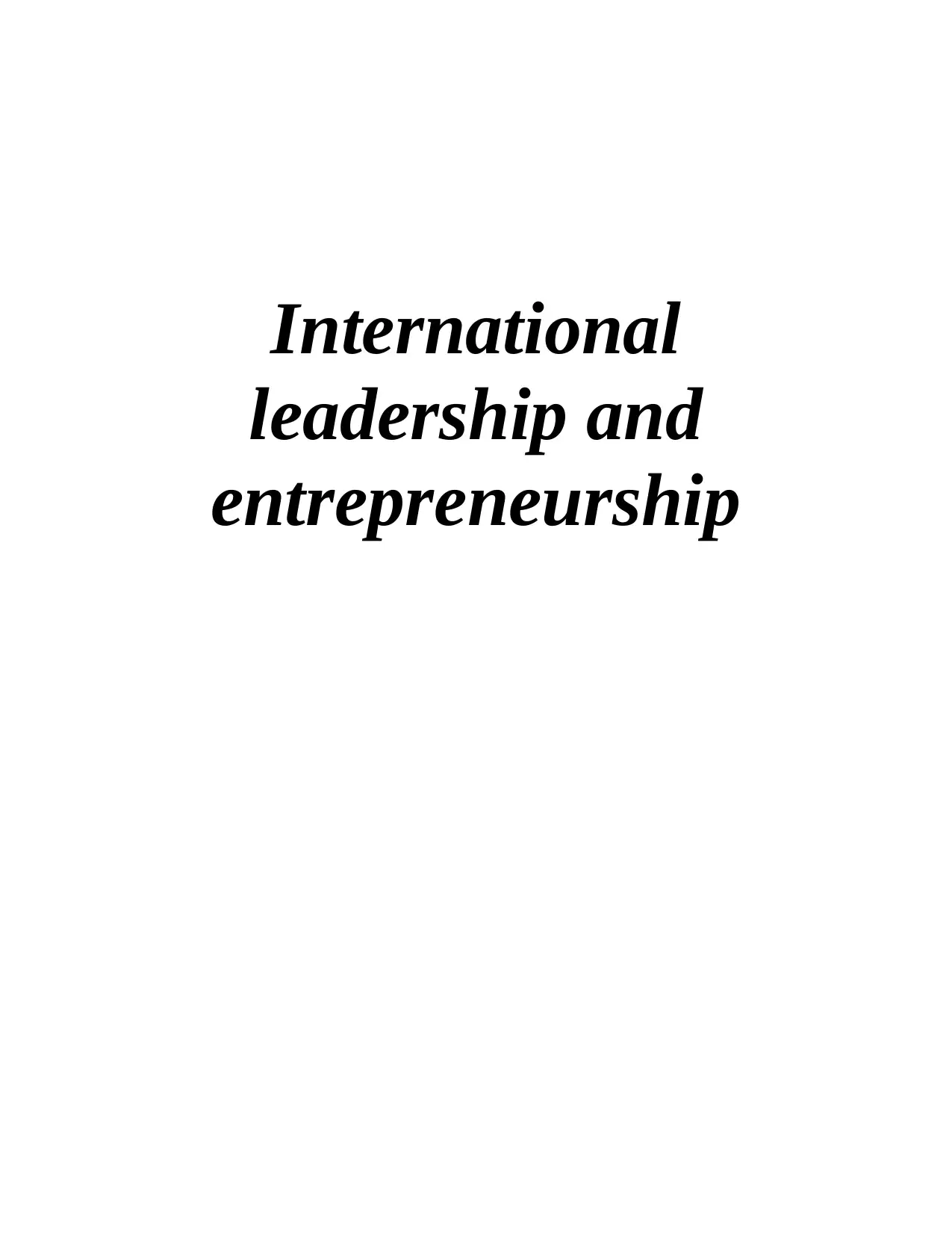
International
leadership and
entrepreneurship
leadership and
entrepreneurship
Paraphrase This Document
Need a fresh take? Get an instant paraphrase of this document with our AI Paraphraser
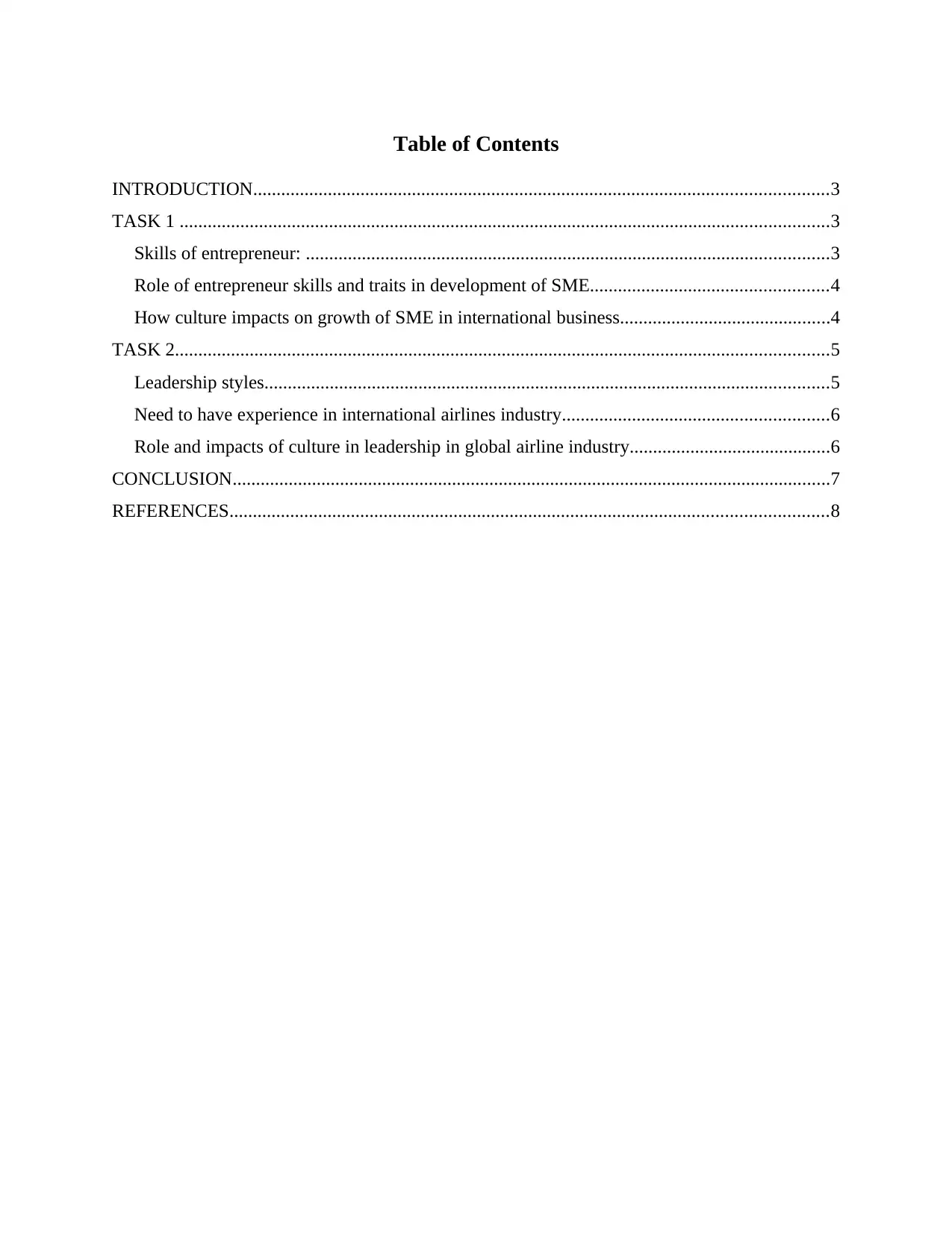
Table of Contents
INTRODUCTION...........................................................................................................................3
TASK 1 ...........................................................................................................................................3
Skills of entrepreneur: ................................................................................................................3
Role of entrepreneur skills and traits in development of SME...................................................4
How culture impacts on growth of SME in international business.............................................4
TASK 2............................................................................................................................................5
Leadership styles.........................................................................................................................5
Need to have experience in international airlines industry.........................................................6
Role and impacts of culture in leadership in global airline industry...........................................6
CONCLUSION................................................................................................................................7
REFERENCES................................................................................................................................8
INTRODUCTION...........................................................................................................................3
TASK 1 ...........................................................................................................................................3
Skills of entrepreneur: ................................................................................................................3
Role of entrepreneur skills and traits in development of SME...................................................4
How culture impacts on growth of SME in international business.............................................4
TASK 2............................................................................................................................................5
Leadership styles.........................................................................................................................5
Need to have experience in international airlines industry.........................................................6
Role and impacts of culture in leadership in global airline industry...........................................6
CONCLUSION................................................................................................................................7
REFERENCES................................................................................................................................8
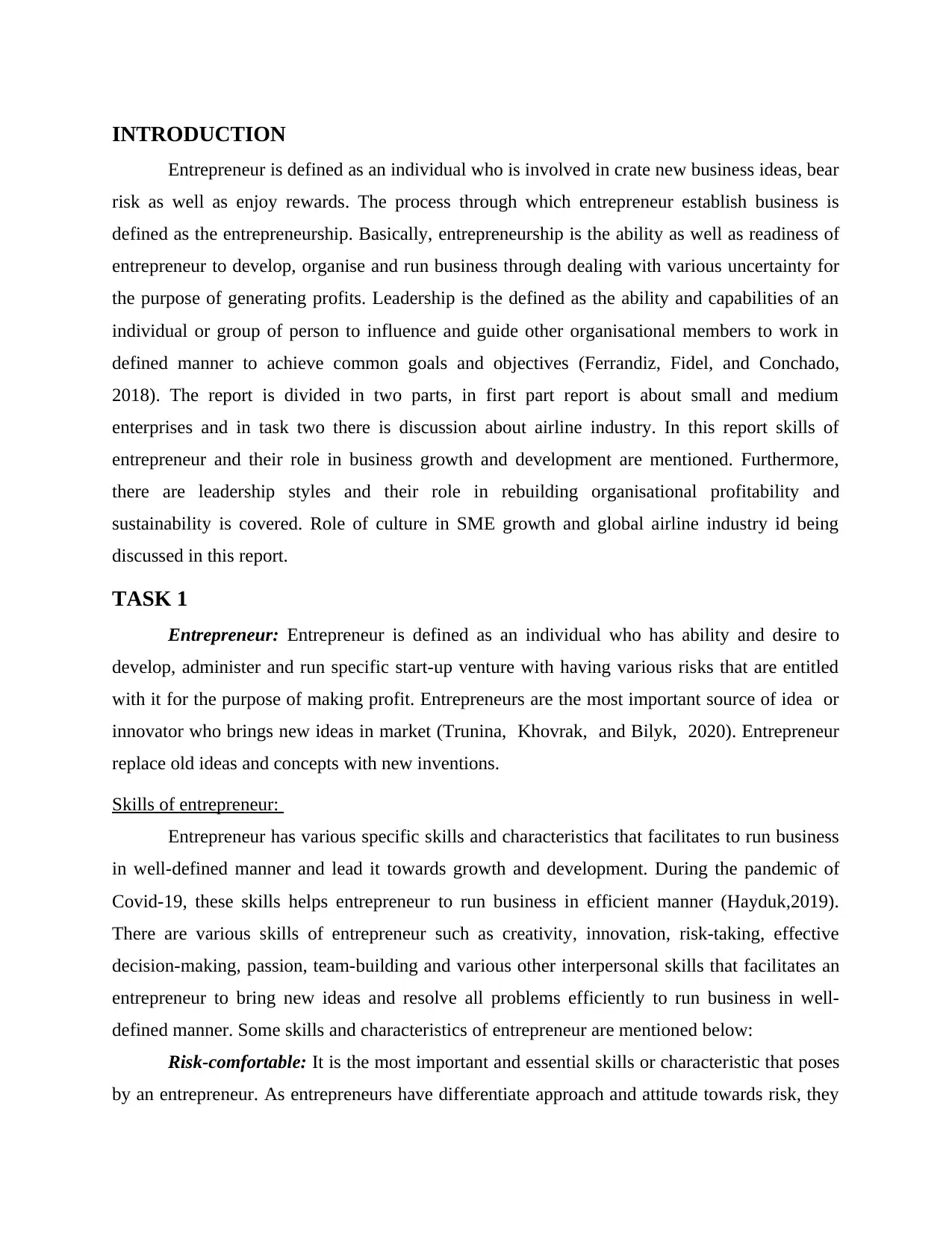
INTRODUCTION
Entrepreneur is defined as an individual who is involved in crate new business ideas, bear
risk as well as enjoy rewards. The process through which entrepreneur establish business is
defined as the entrepreneurship. Basically, entrepreneurship is the ability as well as readiness of
entrepreneur to develop, organise and run business through dealing with various uncertainty for
the purpose of generating profits. Leadership is the defined as the ability and capabilities of an
individual or group of person to influence and guide other organisational members to work in
defined manner to achieve common goals and objectives (Ferrandiz, Fidel, and Conchado,
2018). The report is divided in two parts, in first part report is about small and medium
enterprises and in task two there is discussion about airline industry. In this report skills of
entrepreneur and their role in business growth and development are mentioned. Furthermore,
there are leadership styles and their role in rebuilding organisational profitability and
sustainability is covered. Role of culture in SME growth and global airline industry id being
discussed in this report.
TASK 1
Entrepreneur: Entrepreneur is defined as an individual who has ability and desire to
develop, administer and run specific start-up venture with having various risks that are entitled
with it for the purpose of making profit. Entrepreneurs are the most important source of idea or
innovator who brings new ideas in market (Trunina, Khovrak, and Bilyk, 2020). Entrepreneur
replace old ideas and concepts with new inventions.
Skills of entrepreneur:
Entrepreneur has various specific skills and characteristics that facilitates to run business
in well-defined manner and lead it towards growth and development. During the pandemic of
Covid-19, these skills helps entrepreneur to run business in efficient manner (Hayduk,2019).
There are various skills of entrepreneur such as creativity, innovation, risk-taking, effective
decision-making, passion, team-building and various other interpersonal skills that facilitates an
entrepreneur to bring new ideas and resolve all problems efficiently to run business in well-
defined manner. Some skills and characteristics of entrepreneur are mentioned below:
Risk-comfortable: It is the most important and essential skills or characteristic that poses
by an entrepreneur. As entrepreneurs have differentiate approach and attitude towards risk, they
Entrepreneur is defined as an individual who is involved in crate new business ideas, bear
risk as well as enjoy rewards. The process through which entrepreneur establish business is
defined as the entrepreneurship. Basically, entrepreneurship is the ability as well as readiness of
entrepreneur to develop, organise and run business through dealing with various uncertainty for
the purpose of generating profits. Leadership is the defined as the ability and capabilities of an
individual or group of person to influence and guide other organisational members to work in
defined manner to achieve common goals and objectives (Ferrandiz, Fidel, and Conchado,
2018). The report is divided in two parts, in first part report is about small and medium
enterprises and in task two there is discussion about airline industry. In this report skills of
entrepreneur and their role in business growth and development are mentioned. Furthermore,
there are leadership styles and their role in rebuilding organisational profitability and
sustainability is covered. Role of culture in SME growth and global airline industry id being
discussed in this report.
TASK 1
Entrepreneur: Entrepreneur is defined as an individual who has ability and desire to
develop, administer and run specific start-up venture with having various risks that are entitled
with it for the purpose of making profit. Entrepreneurs are the most important source of idea or
innovator who brings new ideas in market (Trunina, Khovrak, and Bilyk, 2020). Entrepreneur
replace old ideas and concepts with new inventions.
Skills of entrepreneur:
Entrepreneur has various specific skills and characteristics that facilitates to run business
in well-defined manner and lead it towards growth and development. During the pandemic of
Covid-19, these skills helps entrepreneur to run business in efficient manner (Hayduk,2019).
There are various skills of entrepreneur such as creativity, innovation, risk-taking, effective
decision-making, passion, team-building and various other interpersonal skills that facilitates an
entrepreneur to bring new ideas and resolve all problems efficiently to run business in well-
defined manner. Some skills and characteristics of entrepreneur are mentioned below:
Risk-comfortable: It is the most important and essential skills or characteristic that poses
by an entrepreneur. As entrepreneurs have differentiate approach and attitude towards risk, they
⊘ This is a preview!⊘
Do you want full access?
Subscribe today to unlock all pages.

Trusted by 1+ million students worldwide
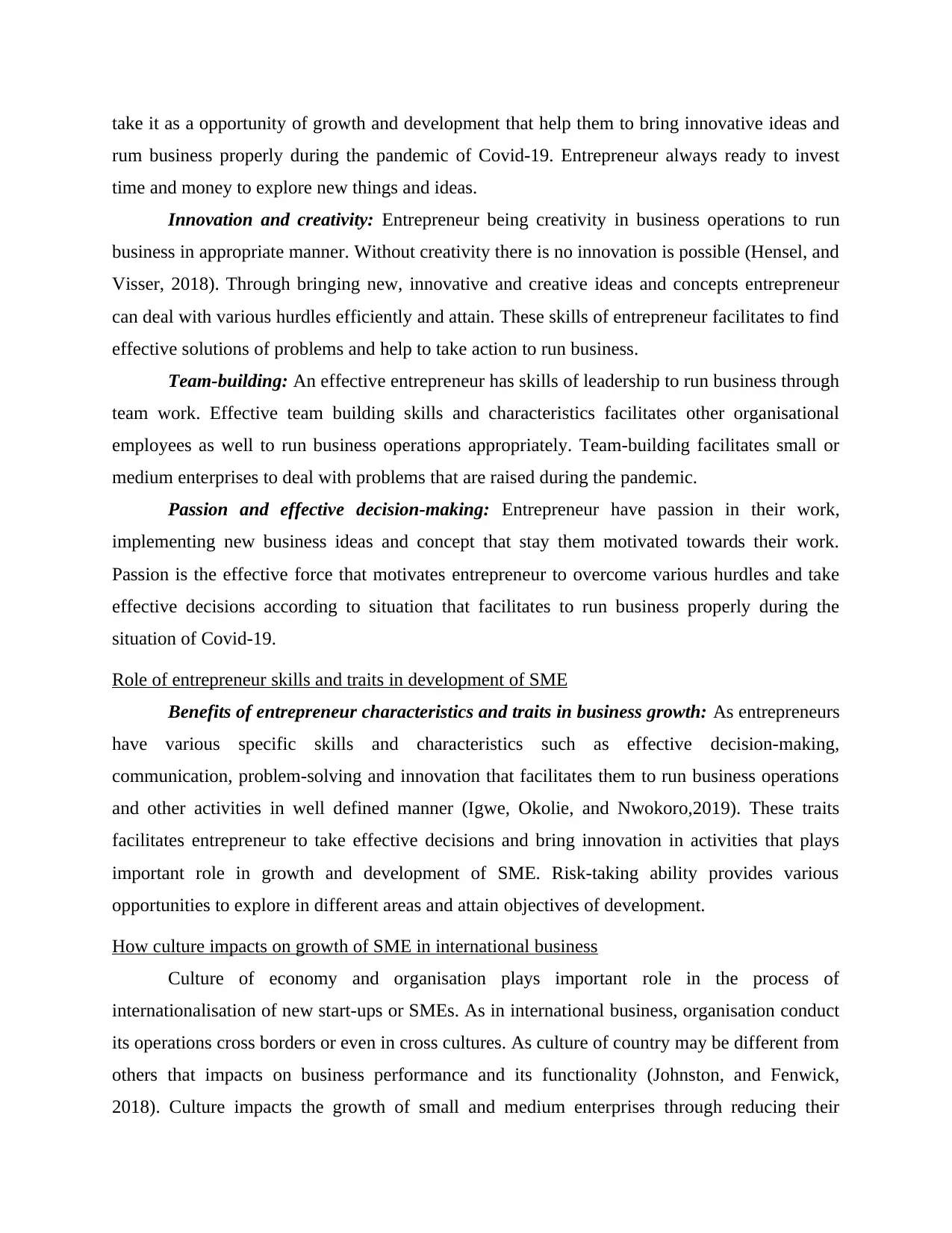
take it as a opportunity of growth and development that help them to bring innovative ideas and
rum business properly during the pandemic of Covid-19. Entrepreneur always ready to invest
time and money to explore new things and ideas.
Innovation and creativity: Entrepreneur being creativity in business operations to run
business in appropriate manner. Without creativity there is no innovation is possible (Hensel, and
Visser, 2018). Through bringing new, innovative and creative ideas and concepts entrepreneur
can deal with various hurdles efficiently and attain. These skills of entrepreneur facilitates to find
effective solutions of problems and help to take action to run business.
Team-building: An effective entrepreneur has skills of leadership to run business through
team work. Effective team building skills and characteristics facilitates other organisational
employees as well to run business operations appropriately. Team-building facilitates small or
medium enterprises to deal with problems that are raised during the pandemic.
Passion and effective decision-making: Entrepreneur have passion in their work,
implementing new business ideas and concept that stay them motivated towards their work.
Passion is the effective force that motivates entrepreneur to overcome various hurdles and take
effective decisions according to situation that facilitates to run business properly during the
situation of Covid-19.
Role of entrepreneur skills and traits in development of SME
Benefits of entrepreneur characteristics and traits in business growth: As entrepreneurs
have various specific skills and characteristics such as effective decision-making,
communication, problem-solving and innovation that facilitates them to run business operations
and other activities in well defined manner (Igwe, Okolie, and Nwokoro,2019). These traits
facilitates entrepreneur to take effective decisions and bring innovation in activities that plays
important role in growth and development of SME. Risk-taking ability provides various
opportunities to explore in different areas and attain objectives of development.
How culture impacts on growth of SME in international business
Culture of economy and organisation plays important role in the process of
internationalisation of new start-ups or SMEs. As in international business, organisation conduct
its operations cross borders or even in cross cultures. As culture of country may be different from
others that impacts on business performance and its functionality (Johnston, and Fenwick,
2018). Culture impacts the growth of small and medium enterprises through reducing their
rum business properly during the pandemic of Covid-19. Entrepreneur always ready to invest
time and money to explore new things and ideas.
Innovation and creativity: Entrepreneur being creativity in business operations to run
business in appropriate manner. Without creativity there is no innovation is possible (Hensel, and
Visser, 2018). Through bringing new, innovative and creative ideas and concepts entrepreneur
can deal with various hurdles efficiently and attain. These skills of entrepreneur facilitates to find
effective solutions of problems and help to take action to run business.
Team-building: An effective entrepreneur has skills of leadership to run business through
team work. Effective team building skills and characteristics facilitates other organisational
employees as well to run business operations appropriately. Team-building facilitates small or
medium enterprises to deal with problems that are raised during the pandemic.
Passion and effective decision-making: Entrepreneur have passion in their work,
implementing new business ideas and concept that stay them motivated towards their work.
Passion is the effective force that motivates entrepreneur to overcome various hurdles and take
effective decisions according to situation that facilitates to run business properly during the
situation of Covid-19.
Role of entrepreneur skills and traits in development of SME
Benefits of entrepreneur characteristics and traits in business growth: As entrepreneurs
have various specific skills and characteristics such as effective decision-making,
communication, problem-solving and innovation that facilitates them to run business operations
and other activities in well defined manner (Igwe, Okolie, and Nwokoro,2019). These traits
facilitates entrepreneur to take effective decisions and bring innovation in activities that plays
important role in growth and development of SME. Risk-taking ability provides various
opportunities to explore in different areas and attain objectives of development.
How culture impacts on growth of SME in international business
Culture of economy and organisation plays important role in the process of
internationalisation of new start-ups or SMEs. As in international business, organisation conduct
its operations cross borders or even in cross cultures. As culture of country may be different from
others that impacts on business performance and its functionality (Johnston, and Fenwick,
2018). Culture impacts the growth of small and medium enterprises through reducing their
Paraphrase This Document
Need a fresh take? Get an instant paraphrase of this document with our AI Paraphraser
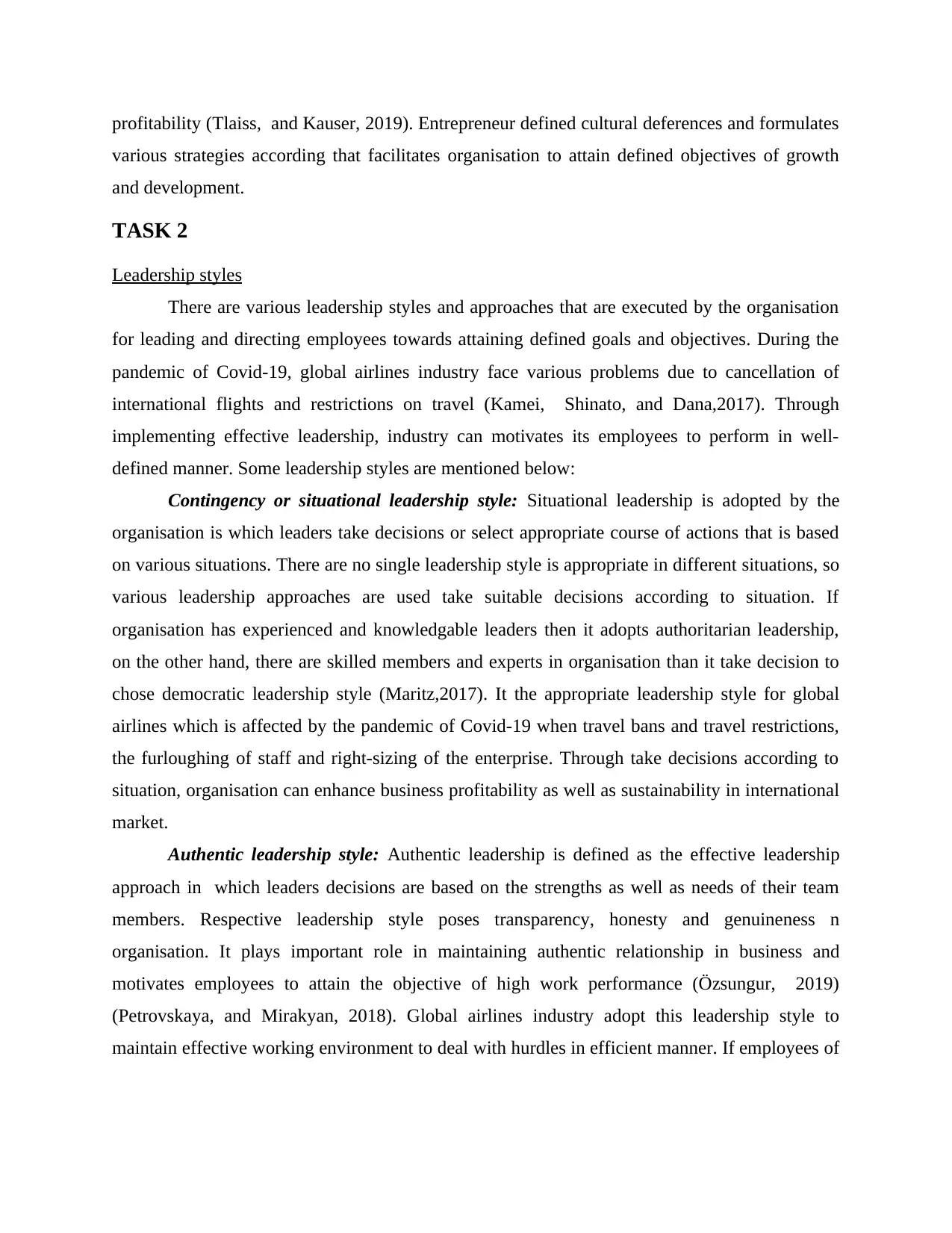
profitability (Tlaiss, and Kauser, 2019). Entrepreneur defined cultural deferences and formulates
various strategies according that facilitates organisation to attain defined objectives of growth
and development.
TASK 2
Leadership styles
There are various leadership styles and approaches that are executed by the organisation
for leading and directing employees towards attaining defined goals and objectives. During the
pandemic of Covid-19, global airlines industry face various problems due to cancellation of
international flights and restrictions on travel (Kamei, Shinato, and Dana,2017). Through
implementing effective leadership, industry can motivates its employees to perform in well-
defined manner. Some leadership styles are mentioned below:
Contingency or situational leadership style: Situational leadership is adopted by the
organisation is which leaders take decisions or select appropriate course of actions that is based
on various situations. There are no single leadership style is appropriate in different situations, so
various leadership approaches are used take suitable decisions according to situation. If
organisation has experienced and knowledgable leaders then it adopts authoritarian leadership,
on the other hand, there are skilled members and experts in organisation than it take decision to
chose democratic leadership style (Maritz,2017). It the appropriate leadership style for global
airlines which is affected by the pandemic of Covid-19 when travel bans and travel restrictions,
the furloughing of staff and right-sizing of the enterprise. Through take decisions according to
situation, organisation can enhance business profitability as well as sustainability in international
market.
Authentic leadership style: Authentic leadership is defined as the effective leadership
approach in which leaders decisions are based on the strengths as well as needs of their team
members. Respective leadership style poses transparency, honesty and genuineness n
organisation. It plays important role in maintaining authentic relationship in business and
motivates employees to attain the objective of high work performance (Özsungur, 2019)
(Petrovskaya, and Mirakyan, 2018). Global airlines industry adopt this leadership style to
maintain effective working environment to deal with hurdles in efficient manner. If employees of
various strategies according that facilitates organisation to attain defined objectives of growth
and development.
TASK 2
Leadership styles
There are various leadership styles and approaches that are executed by the organisation
for leading and directing employees towards attaining defined goals and objectives. During the
pandemic of Covid-19, global airlines industry face various problems due to cancellation of
international flights and restrictions on travel (Kamei, Shinato, and Dana,2017). Through
implementing effective leadership, industry can motivates its employees to perform in well-
defined manner. Some leadership styles are mentioned below:
Contingency or situational leadership style: Situational leadership is adopted by the
organisation is which leaders take decisions or select appropriate course of actions that is based
on various situations. There are no single leadership style is appropriate in different situations, so
various leadership approaches are used take suitable decisions according to situation. If
organisation has experienced and knowledgable leaders then it adopts authoritarian leadership,
on the other hand, there are skilled members and experts in organisation than it take decision to
chose democratic leadership style (Maritz,2017). It the appropriate leadership style for global
airlines which is affected by the pandemic of Covid-19 when travel bans and travel restrictions,
the furloughing of staff and right-sizing of the enterprise. Through take decisions according to
situation, organisation can enhance business profitability as well as sustainability in international
market.
Authentic leadership style: Authentic leadership is defined as the effective leadership
approach in which leaders decisions are based on the strengths as well as needs of their team
members. Respective leadership style poses transparency, honesty and genuineness n
organisation. It plays important role in maintaining authentic relationship in business and
motivates employees to attain the objective of high work performance (Özsungur, 2019)
(Petrovskaya, and Mirakyan, 2018). Global airlines industry adopt this leadership style to
maintain effective working environment to deal with hurdles in efficient manner. If employees of
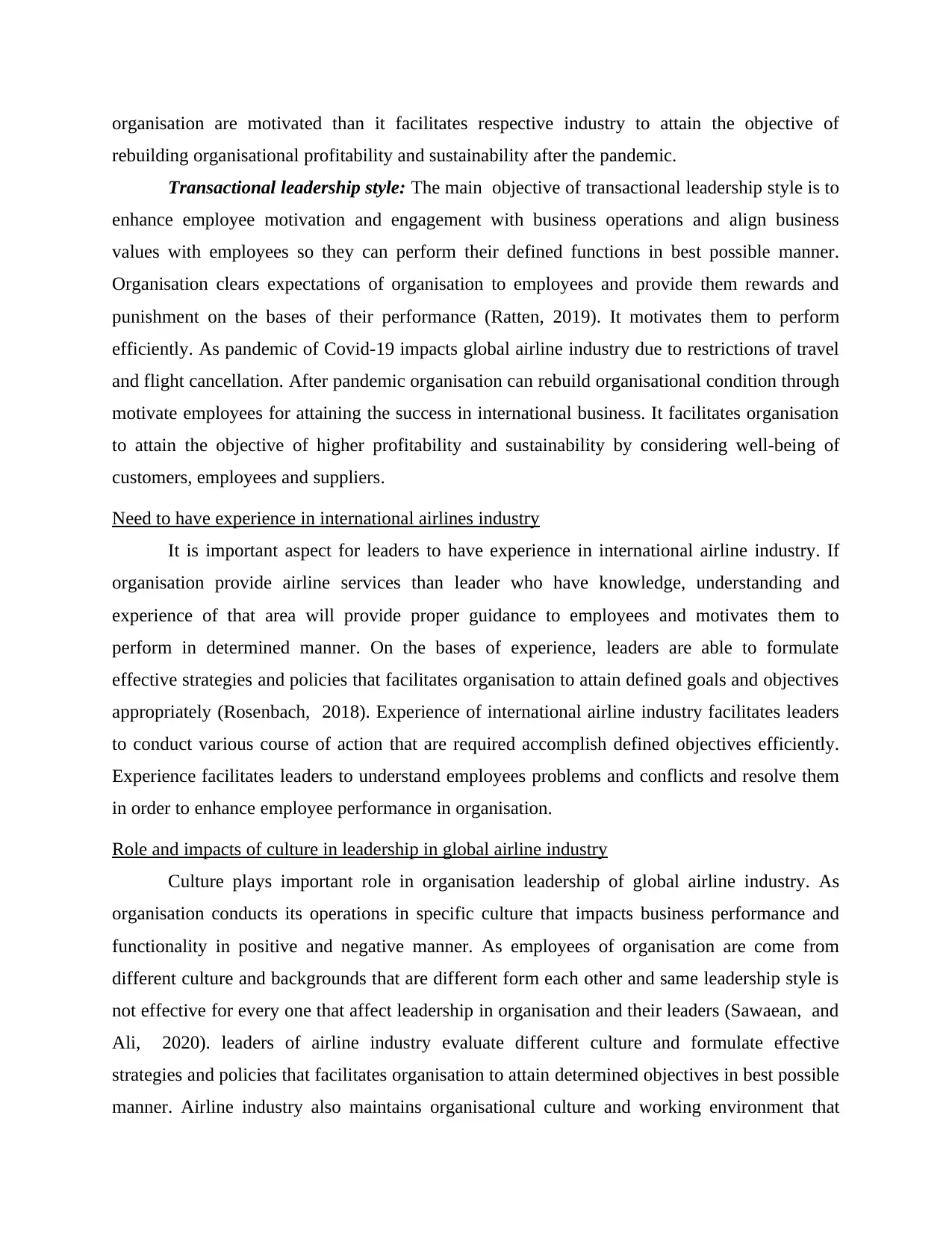
organisation are motivated than it facilitates respective industry to attain the objective of
rebuilding organisational profitability and sustainability after the pandemic.
Transactional leadership style: The main objective of transactional leadership style is to
enhance employee motivation and engagement with business operations and align business
values with employees so they can perform their defined functions in best possible manner.
Organisation clears expectations of organisation to employees and provide them rewards and
punishment on the bases of their performance (Ratten, 2019). It motivates them to perform
efficiently. As pandemic of Covid-19 impacts global airline industry due to restrictions of travel
and flight cancellation. After pandemic organisation can rebuild organisational condition through
motivate employees for attaining the success in international business. It facilitates organisation
to attain the objective of higher profitability and sustainability by considering well-being of
customers, employees and suppliers.
Need to have experience in international airlines industry
It is important aspect for leaders to have experience in international airline industry. If
organisation provide airline services than leader who have knowledge, understanding and
experience of that area will provide proper guidance to employees and motivates them to
perform in determined manner. On the bases of experience, leaders are able to formulate
effective strategies and policies that facilitates organisation to attain defined goals and objectives
appropriately (Rosenbach, 2018). Experience of international airline industry facilitates leaders
to conduct various course of action that are required accomplish defined objectives efficiently.
Experience facilitates leaders to understand employees problems and conflicts and resolve them
in order to enhance employee performance in organisation.
Role and impacts of culture in leadership in global airline industry
Culture plays important role in organisation leadership of global airline industry. As
organisation conducts its operations in specific culture that impacts business performance and
functionality in positive and negative manner. As employees of organisation are come from
different culture and backgrounds that are different form each other and same leadership style is
not effective for every one that affect leadership in organisation and their leaders (Sawaean, and
Ali, 2020). leaders of airline industry evaluate different culture and formulate effective
strategies and policies that facilitates organisation to attain determined objectives in best possible
manner. Airline industry also maintains organisational culture and working environment that
rebuilding organisational profitability and sustainability after the pandemic.
Transactional leadership style: The main objective of transactional leadership style is to
enhance employee motivation and engagement with business operations and align business
values with employees so they can perform their defined functions in best possible manner.
Organisation clears expectations of organisation to employees and provide them rewards and
punishment on the bases of their performance (Ratten, 2019). It motivates them to perform
efficiently. As pandemic of Covid-19 impacts global airline industry due to restrictions of travel
and flight cancellation. After pandemic organisation can rebuild organisational condition through
motivate employees for attaining the success in international business. It facilitates organisation
to attain the objective of higher profitability and sustainability by considering well-being of
customers, employees and suppliers.
Need to have experience in international airlines industry
It is important aspect for leaders to have experience in international airline industry. If
organisation provide airline services than leader who have knowledge, understanding and
experience of that area will provide proper guidance to employees and motivates them to
perform in determined manner. On the bases of experience, leaders are able to formulate
effective strategies and policies that facilitates organisation to attain defined goals and objectives
appropriately (Rosenbach, 2018). Experience of international airline industry facilitates leaders
to conduct various course of action that are required accomplish defined objectives efficiently.
Experience facilitates leaders to understand employees problems and conflicts and resolve them
in order to enhance employee performance in organisation.
Role and impacts of culture in leadership in global airline industry
Culture plays important role in organisation leadership of global airline industry. As
organisation conducts its operations in specific culture that impacts business performance and
functionality in positive and negative manner. As employees of organisation are come from
different culture and backgrounds that are different form each other and same leadership style is
not effective for every one that affect leadership in organisation and their leaders (Sawaean, and
Ali, 2020). leaders of airline industry evaluate different culture and formulate effective
strategies and policies that facilitates organisation to attain determined objectives in best possible
manner. Airline industry also maintains organisational culture and working environment that
⊘ This is a preview!⊘
Do you want full access?
Subscribe today to unlock all pages.

Trusted by 1+ million students worldwide
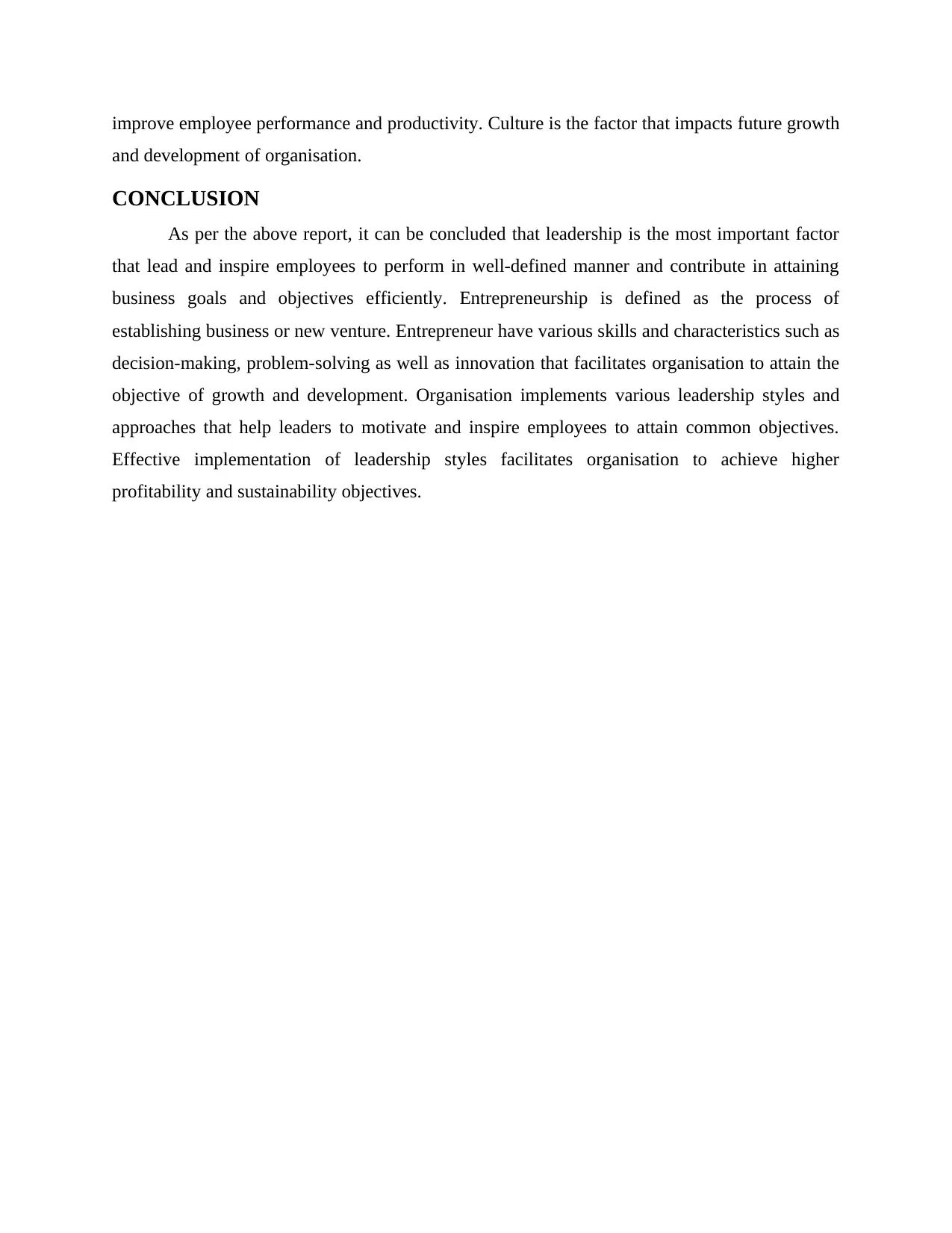
improve employee performance and productivity. Culture is the factor that impacts future growth
and development of organisation.
CONCLUSION
As per the above report, it can be concluded that leadership is the most important factor
that lead and inspire employees to perform in well-defined manner and contribute in attaining
business goals and objectives efficiently. Entrepreneurship is defined as the process of
establishing business or new venture. Entrepreneur have various skills and characteristics such as
decision-making, problem-solving as well as innovation that facilitates organisation to attain the
objective of growth and development. Organisation implements various leadership styles and
approaches that help leaders to motivate and inspire employees to attain common objectives.
Effective implementation of leadership styles facilitates organisation to achieve higher
profitability and sustainability objectives.
and development of organisation.
CONCLUSION
As per the above report, it can be concluded that leadership is the most important factor
that lead and inspire employees to perform in well-defined manner and contribute in attaining
business goals and objectives efficiently. Entrepreneurship is defined as the process of
establishing business or new venture. Entrepreneur have various skills and characteristics such as
decision-making, problem-solving as well as innovation that facilitates organisation to attain the
objective of growth and development. Organisation implements various leadership styles and
approaches that help leaders to motivate and inspire employees to attain common objectives.
Effective implementation of leadership styles facilitates organisation to achieve higher
profitability and sustainability objectives.
Paraphrase This Document
Need a fresh take? Get an instant paraphrase of this document with our AI Paraphraser
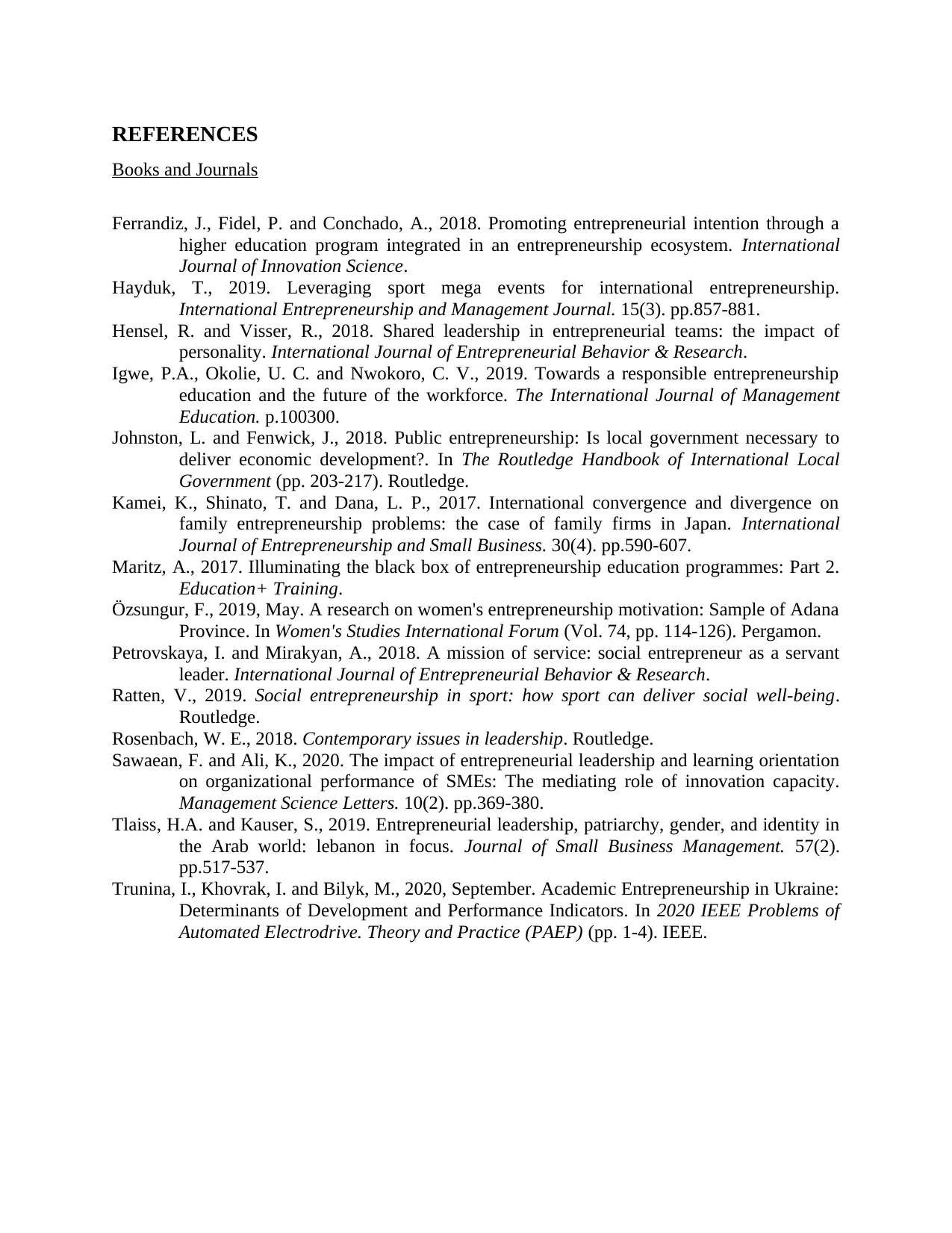
REFERENCES
Books and Journals
Ferrandiz, J., Fidel, P. and Conchado, A., 2018. Promoting entrepreneurial intention through a
higher education program integrated in an entrepreneurship ecosystem. International
Journal of Innovation Science.
Hayduk, T., 2019. Leveraging sport mega events for international entrepreneurship.
International Entrepreneurship and Management Journal. 15(3). pp.857-881.
Hensel, R. and Visser, R., 2018. Shared leadership in entrepreneurial teams: the impact of
personality. International Journal of Entrepreneurial Behavior & Research.
Igwe, P.A., Okolie, U. C. and Nwokoro, C. V., 2019. Towards a responsible entrepreneurship
education and the future of the workforce. The International Journal of Management
Education. p.100300.
Johnston, L. and Fenwick, J., 2018. Public entrepreneurship: Is local government necessary to
deliver economic development?. In The Routledge Handbook of International Local
Government (pp. 203-217). Routledge.
Kamei, K., Shinato, T. and Dana, L. P., 2017. International convergence and divergence on
family entrepreneurship problems: the case of family firms in Japan. International
Journal of Entrepreneurship and Small Business. 30(4). pp.590-607.
Maritz, A., 2017. Illuminating the black box of entrepreneurship education programmes: Part 2.
Education+ Training.
Özsungur, F., 2019, May. A research on women's entrepreneurship motivation: Sample of Adana
Province. In Women's Studies International Forum (Vol. 74, pp. 114-126). Pergamon.
Petrovskaya, I. and Mirakyan, A., 2018. A mission of service: social entrepreneur as a servant
leader. International Journal of Entrepreneurial Behavior & Research.
Ratten, V., 2019. Social entrepreneurship in sport: how sport can deliver social well-being.
Routledge.
Rosenbach, W. E., 2018. Contemporary issues in leadership. Routledge.
Sawaean, F. and Ali, K., 2020. The impact of entrepreneurial leadership and learning orientation
on organizational performance of SMEs: The mediating role of innovation capacity.
Management Science Letters. 10(2). pp.369-380.
Tlaiss, H.A. and Kauser, S., 2019. Entrepreneurial leadership, patriarchy, gender, and identity in
the Arab world: lebanon in focus. Journal of Small Business Management. 57(2).
pp.517-537.
Trunina, I., Khovrak, I. and Bilyk, M., 2020, September. Academic Entrepreneurship in Ukraine:
Determinants of Development and Performance Indicators. In 2020 IEEE Problems of
Automated Electrodrive. Theory and Practice (PAEP) (pp. 1-4). IEEE.
Books and Journals
Ferrandiz, J., Fidel, P. and Conchado, A., 2018. Promoting entrepreneurial intention through a
higher education program integrated in an entrepreneurship ecosystem. International
Journal of Innovation Science.
Hayduk, T., 2019. Leveraging sport mega events for international entrepreneurship.
International Entrepreneurship and Management Journal. 15(3). pp.857-881.
Hensel, R. and Visser, R., 2018. Shared leadership in entrepreneurial teams: the impact of
personality. International Journal of Entrepreneurial Behavior & Research.
Igwe, P.A., Okolie, U. C. and Nwokoro, C. V., 2019. Towards a responsible entrepreneurship
education and the future of the workforce. The International Journal of Management
Education. p.100300.
Johnston, L. and Fenwick, J., 2018. Public entrepreneurship: Is local government necessary to
deliver economic development?. In The Routledge Handbook of International Local
Government (pp. 203-217). Routledge.
Kamei, K., Shinato, T. and Dana, L. P., 2017. International convergence and divergence on
family entrepreneurship problems: the case of family firms in Japan. International
Journal of Entrepreneurship and Small Business. 30(4). pp.590-607.
Maritz, A., 2017. Illuminating the black box of entrepreneurship education programmes: Part 2.
Education+ Training.
Özsungur, F., 2019, May. A research on women's entrepreneurship motivation: Sample of Adana
Province. In Women's Studies International Forum (Vol. 74, pp. 114-126). Pergamon.
Petrovskaya, I. and Mirakyan, A., 2018. A mission of service: social entrepreneur as a servant
leader. International Journal of Entrepreneurial Behavior & Research.
Ratten, V., 2019. Social entrepreneurship in sport: how sport can deliver social well-being.
Routledge.
Rosenbach, W. E., 2018. Contemporary issues in leadership. Routledge.
Sawaean, F. and Ali, K., 2020. The impact of entrepreneurial leadership and learning orientation
on organizational performance of SMEs: The mediating role of innovation capacity.
Management Science Letters. 10(2). pp.369-380.
Tlaiss, H.A. and Kauser, S., 2019. Entrepreneurial leadership, patriarchy, gender, and identity in
the Arab world: lebanon in focus. Journal of Small Business Management. 57(2).
pp.517-537.
Trunina, I., Khovrak, I. and Bilyk, M., 2020, September. Academic Entrepreneurship in Ukraine:
Determinants of Development and Performance Indicators. In 2020 IEEE Problems of
Automated Electrodrive. Theory and Practice (PAEP) (pp. 1-4). IEEE.
1 out of 8
Related Documents
Your All-in-One AI-Powered Toolkit for Academic Success.
+13062052269
info@desklib.com
Available 24*7 on WhatsApp / Email
![[object Object]](/_next/static/media/star-bottom.7253800d.svg)
Unlock your academic potential
Copyright © 2020–2025 A2Z Services. All Rights Reserved. Developed and managed by ZUCOL.





